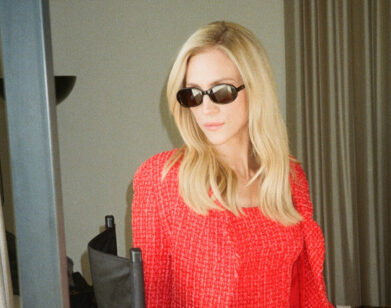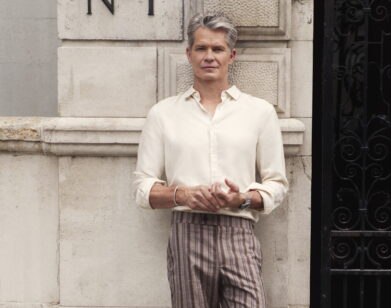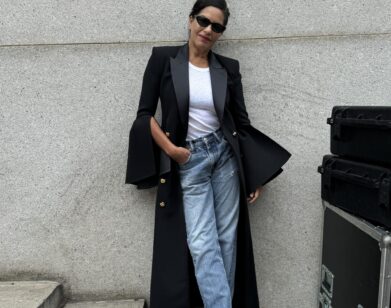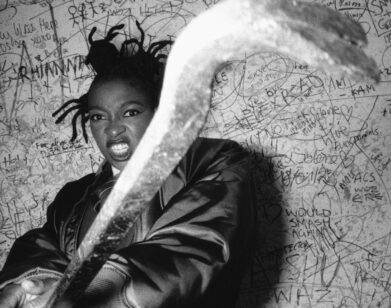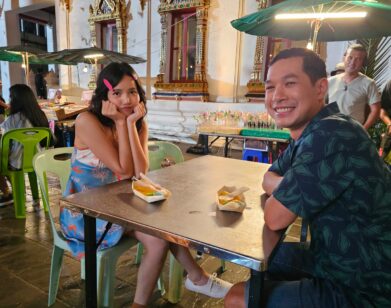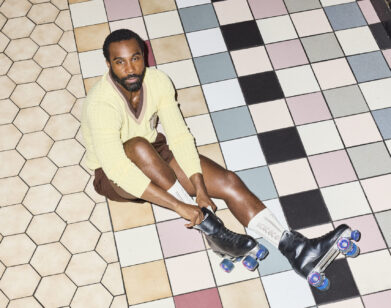The future of TV is female
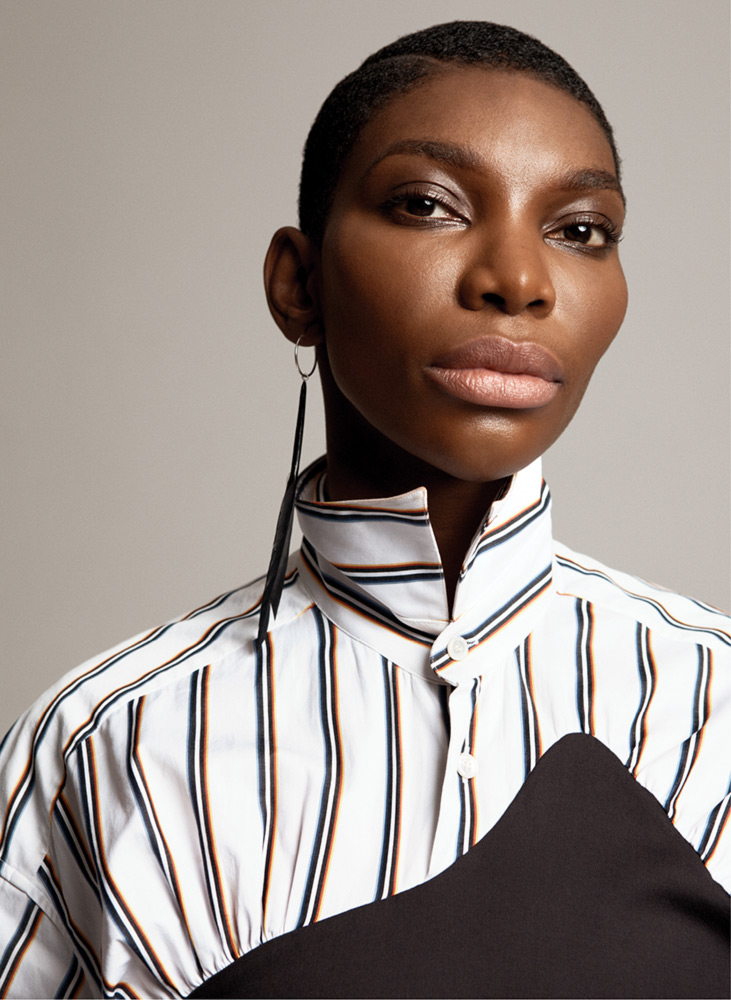
DRESS AND EARRING: AALTO. HAIR: KOTA SUIZU USING ORIBE/CAREN. MAKEUP: ALEX BABSKY/PREMIER HAIR AND MAKEUP. SPECIAL THANKS: LOFT STUDIOS.
Time’s up. A new era. The great reckoning. Whatever you call it, or whichever hashtags you put on it, it’s today, it’s today. The time right now is about women. Some men won’t like it. Well, tough titties. (Sorry, not sorry.) It’s being mandated, get it? Man-dated. And it’s about time. I think Lewis Black said it best, when he said that his generation should have solved this with equal rights and women’s liberation. But women, again, were put on the backburner. And the stove exploded.
When I was asked by Interview magazine to moderate a conversation with four other ladies—like myself, all TV series creators and two of them, stars of those shows—I jumped at the chance. And when I ended up getting on the phone with all of them—Michaela Coel (the BAFTA Award–winning creator and star of the British sitcom Chewing Gum), Lisa Joy (the executive producer, co-creator, and co-showrunner of HBO’s Emmy- and Golden Globe–nominated sci-fi thriller Westworld), Frankie Shaw (the Golden Globe–nominated star and creator of Showtime’s dark comedy SMILF), and Lena Waithe (an Emmy winner for her writing work on Netflix’s Master of None and the creator of Showtime’s Chicago-set drama The Chi)—it felt safe. It felt like a community. We could have carried on all day.
I am gripped with excitement for the future of our industry, for the possibilities of new, female-led stories and truths. Stories that are guided by women, shepherded by women, and created by women. Stories to be consumed by people. All people. I have often felt that women sharing their truths with each other, no matter how painful and scary, is a gift like no other. When you lay yourself bare and expect nothing in return, everybody wins. Speaking your truth gives you perspective, and receiving someone’s truth gives you a guidepost for your life—it helps inform and shape your own story, your own trajectory. It elevates your life. We buoy each other. We are daughters and nieces and aunties and granddaughters and mothers. We are boy-ish and girl-y and hard and soft and funny and nerdy and weird. We are not anti-heroes, because there’s no such thing. We are just people. We are all people. And we have some flax-golden tales to spin. P.S. I still love men. But they need to learn how to be a person. —PAMELA ADLON, the co-creator, executive producer, writer, director, and star of the Peabody Award–winning FX comedy Better Things
PAMELA ADLON: I wish we could have done this in person.
LENA WAITHE: But we all know that if we did that, we’d be in a room for, like, the entire day.
ADLON: I’m the matriarch here. I’m the old guard. My life literally began at 50. Coming up, I didn’t have a lot of female role models. I could count on one hand the number of lady directors I’ve worked with, and that was only much, much later in my life. I think that this is so cool, this new era we’re in. Lena, I’ve seen you in Master of None, and you cracked my head open, and then I watched the premiere of The Chi, and it was incredible. Frankie, SMILF is incredible. Michaela, Chewing Gum is incredible. And Lisa, fuck you, because I’m now living in Westworld. [Joy laughs] I’m four episodes in. I feel like it’s making me smarter.
LISA JOY: If you figure it out, tell me what it all means.
ADLON: Let’s start with you, Lena. Were you always writing? Who were your influences?
WAITHE: I was always writing as a kid. I was really blessed that my teachers picked up on my writing voice, even in, like, the fifth grade. I’ll never forget when my fifth-grade teacher said to me, “I look forward to reading your papers, because you write the way that you speak.” And I’ve always loved watching television. I grew up in a two-parent household: my mom and the television. I watched A Different World and The Cosby Show. I was really blessed to be able to see images of black people like me, even though The Cosby Show was very aspirational and we were not living like that. Or on The Fresh Prince of Bel-Air, seeing them living in a mansion—I didn’t even know what Bel-Air was, but I knew it was something I wanted. I think my confidence came from looking at my mom and my aunt and my grandmother and my older sister. I was surrounded by a bunch of sassy black women, so I couldn’t help but grow up to be a sassy black woman myself.
ADLON: I relate to you in that I always felt female but never feminine. I’m seeing you kind of cobble together a career for yourself as an actor straddling the gender line, just as I did. It feels so good to be able to present yourself in a way that makes you feel comfortable and powerful, instead of people telling you how to be. Frankie, what about you? Did you ever aspire to be an actress with your own show?
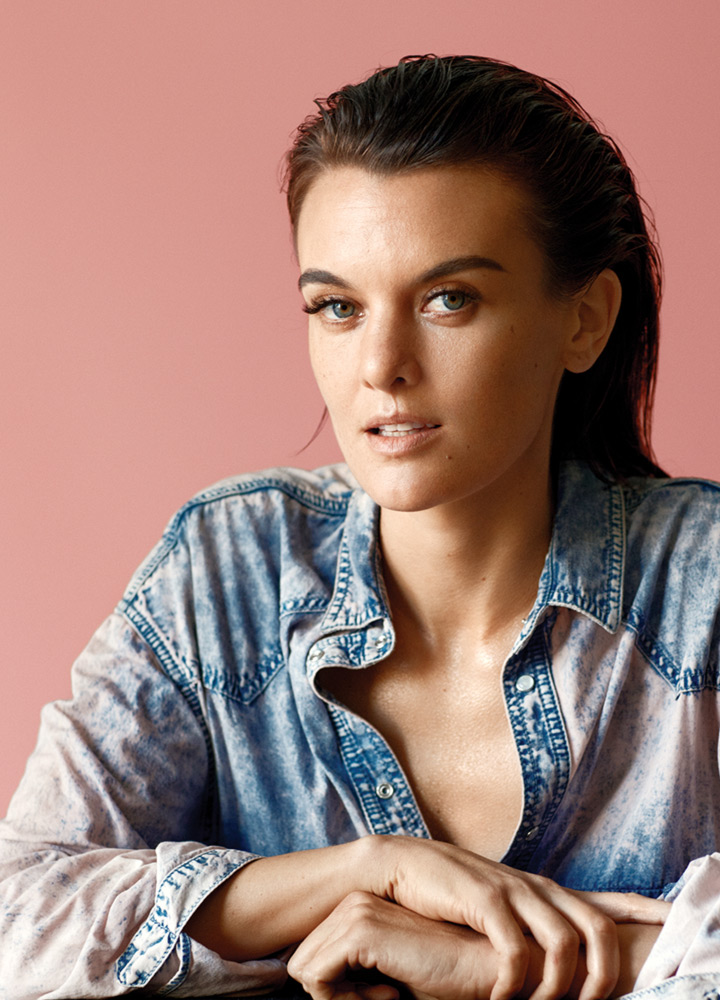
SHIRT: DKNY. HAIR: JAMAL HAMMADI/ART DEPARTMENT. MAKEUP: OZZY SALVATIERRA/LOWE & CO. MANICURE: BETINA GOLDSTEIN USING TOM FORD/LOWE & CO. SPECIAL THANKS: SMASHBOX STUDIOS.
FRANKIE SHAW: I grew up playing basketball every day after school. It was just me and my mom, really, so I would disappear into books—that’s how I dealt with the loneliness of my childhood. I wasn’t exposed to the arts until I got to New York for college. I’d assumed I had to become an actress because I was female. I didn’t know that I could be a creator and a director until I got on set and was like, “Oh shit, I want to be the one in control.” That took ten years of being in these terrible experiences as an actor, wearing a push-up bra and heels and not feeling like myself.
MICHAELA COEL: I didn’t have a particularly creative upbringing either. We learned art and percussion in school, but my family wasn’t really creative. My mom makes me dresses, so I guess that would be the closest thing to the arts in my house, but it didn’t lead me to be a writer. For me, learning how to write creatively started with poetry. That was around 2006. I didn’t start writing for TV until the end of 2014, which was Chewing Gum.
ADLON: What about you, Lisa?
JOY: I was actually born a robot, so Westworld is just autobiographical. [all laugh] It’s so amazing listening to you guys talk, because all I can think is how I want a time machine to go back to some version of the past where we could have all hung out. You all would have been a really nice posse.
WAITHE: I agree!
JOY: Like you guys, I’ve always loved writing. I also started with poetry, but in my world poetry was never going to be a career path, nor was any writing in the arts. It was just this pestering thing that wouldn’t leave me alone, so I’d do it in secret. And I was kind of shy so I always liked reading. Reading makes you feel like someone’s reaching out across time, giving you a hand to squeeze and saying, “I felt this thing that you’re feeling now.” Even though I grew up in America, at home we spoke mostly Chinese, because my mom is from Taiwan. My thoughts weren’t fully in Chinese, but they also weren’t fully in English—it was this weird mix. I was so afraid I would say the wrong thing or people wouldn’t understand me. I think that’s why I respond to mythology a lot—you see the journey of an outsider and realize that everybody’s an outsider. It’s the most universal thing about us. But in these quests you saw them be okay. I gathered a lot of inspiration from that, but it took me a while to venture into writing. I tried to be safe in terms of financial security: I did business, I did law, and only kind of boomeranged back in when I felt like I wasn’t going to be letting myself or anyone down in terms of making a living.
ADLON: That’s a huge thing, security. I started working as an actor when I was about 12, and I started helping my parents out financially because my dad wasn’t getting jobs as a TV writer. It was a time in Hollywood when there was a lot of ageism, which weirdly doesn’t seem to be the case anymore. I’m 50, like my dad was then, and my life is blowing up in every direction. This is the era of female characters. The concept of an “antihero” is just a fucking anachronism at this point.
SHAW: That shit drives me crazy.
ADLON: Right?
SHAW: It’s like, “Maybe I don’t fit into whatever fantasy idea you have of what a mom should be, but this is just real life and this is my perspective and it’s human.” My character is not an antihero, she’s a three-dimensional character. She’s fully encompassing everything a human is, but to whatever male critic or male viewer or brainwashed woman who is watching, she’s an antihero.
COEL: I completely agree. When you think of, like, Thor, or people who are traditionally thought of as “heroes,” they’re really strong and they win a fight: so fucking what? There’s nothing to overcome. A real hero is the person who overcomes the thing that nobody thought they’d overcome. [Shaw’s character on SMILF] Bridgette is the hero, because look at how heroically she’s managing. When I think about Wonder Woman, no one calls her an antihero, because there are men who get sexual pleasure from her. But a character like Bridgette—and I’m thinking of my character, Tracey, too—yeah, maybe those characters make men uncomfortable, because they’re clearly not existing for you at all. We haven’t thought about you.
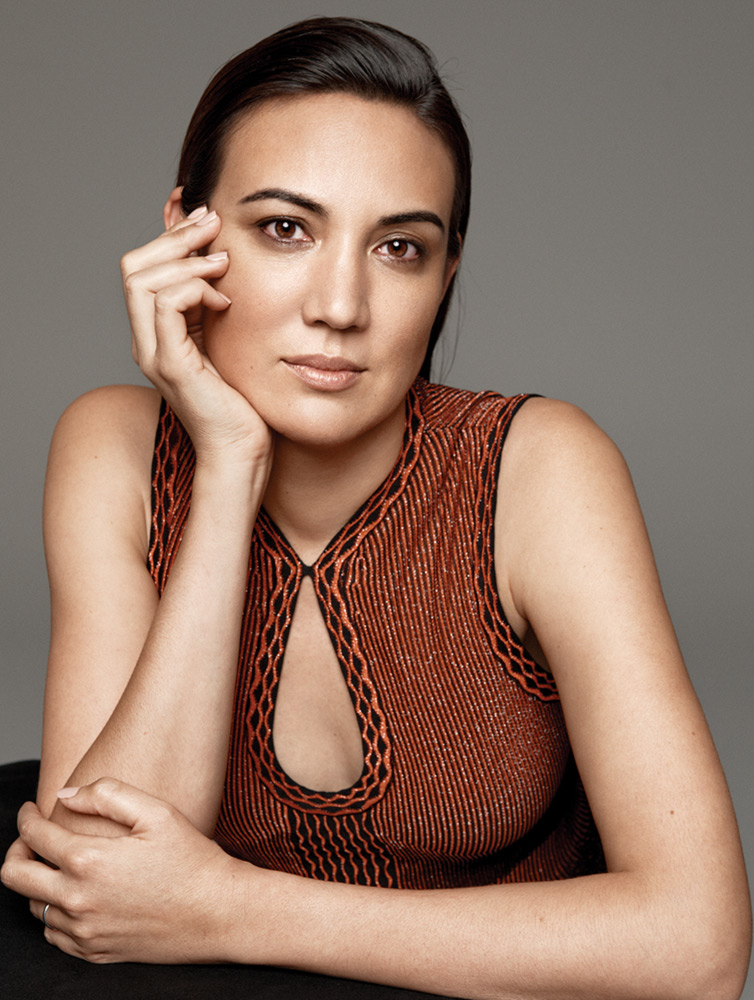
DRESS: AZZEDINE ALAÏA. RING: TIFFANY & CO. HAIR: JAMAL HAMMADI/ ART DEPARTMENT. MAKEUP: OZZY SALVATIERRA/LOWE & CO. MANICURE: BETINA GOLDSTEIN USING TOM FORD/LOWE & CO. SPECIAL THANKS: SMASHBOX STUDIOS.
JOY: I worked in the DA’s office for a while in law school, and I chose to work in the family violence group. There is nothing worse or more gruesome than the family violence group. For me, writing became a way of processing not just my own experiences, but the experiences of other people, and their pain. So our show deals with sexual violence, especially in the pilot, where there is an implied rape offscreen. Before—and even after—it came out, there were a couple of headlines that were like, “Graphic onscreen rape scene!” And I’d be like…“Didn’t you watch it? There’s nothing onscreen.” But they still felt traumatized by it, which is exactly what you should feel from watching something like that happen to someone. I didn’t want to glorify rape or use it as a theme, but it was something I had been thinking about because it happens.
ADLON: That’s what I try to do with my show. I don’t want to give all of this exposition.
WAITHE: I love your courage to tell the story in that way. You’re not telling me what to think. And, Pam, particularly as a person who grew up with an absentee father, there’s something really powerful about the way that you handle the father character in your show. My father, he would pop up sometimes and then would go away. My sister and I interpreted or internalized that differently. He passed away suddenly when I was 14. I didn’t even want to go to his funeral, but my sister did, so I was forced to go. There is something very visceral about the way you handle those kinds of conflicting emotions on the show.
ADLON: You guys all talked about books and reading. We all came up with books, but it’s so sad because I think about my kids and their inability to sit down and quiet their minds and read books anymore.
WAITHE: I used to steal my mom’s books when I was a kid. She had everything from Terry McMillan and Iyanla Vanzant to James Baldwin and Langston Hughes, so I was reading all of that stuff. Maybe I shouldn’t have been, because a lot of it was very adult, but it gave me the whole scope of what it meant to be black, from many different perspectives. I know now that reading those books and taking in those words really helped me to define what a voice is.
SHAW: My mom exposed me to a lot of different literature. There was this Japanese writer Banana Yoshimoto, and then Jamaica Kincaid and Toni Morrison. I had all of their books. Reading really helped put myself in the center of a story: as a woman and as someone growing up working class, I could be the hero. In SMILF, one of the big ideas is we see Bridgette going from object to subject of her story, because a lot of women see ourselves as objects, based on what we’re shown and taught and how we’re treated.
JOY: Growing up, I would take out books from the school library and hide them in the hamper. I’d wait until my parents fell asleep, and then I’d sneak into the bathroom, turn on the light, and dig out the books and read all night. I still don’t know if they knew I was doing that. Today, with two young kids, and between shows, it’s hard to get input—it’s all output. The other day I got on Amazon and ordered a good writing pen. It cost 15 dollars, but it was totally worth it. I got some nice paper and wrote letters to a couple of friends. There’s something about the solitude of putting pen to paper and writing for someone you care about.
COEL: I’m a huge reader now. I keep going on about this book The Subtle Art of Not Giving a F*ck. As a kid, I did have a huge reading phase where I was obsessed with Goosebumps—I was marathoning those. I wanted to see how many of them I could read, because there are loads. And then I read a lot of black American love stories. They had loads of sex in them. That was my teenage reading.
ADLON: If I try to take my kids’ phones or computers away from them to get them to read, they always go, “But we need them for homework, mom!” Which is total fucking bullshit. Frankie, you have a young one, right?
SHAW: He’s 9.
ADLON: As a kid, I was allowed one hour of TV a week, two hours on the weekends. And my father was a television writer and producer! I have three daughters, and they’re going to school with boys who are watching porn on their phones. It’s a nightmare.
SHAW: I’m raising a son, so I’m constantly talking to him about the way in which media portrays women. When he’s drawing, let’s say, an army, I’m like, “Which one in the army is a woman? Where’s the woman?” I’m constantly in his ear because of what the narrative in our culture is telling him. We have to combat that. And I think we are all doing that with our shows, because we are female storytellers. We all have our stories. And it seems that, with the #MeToo movement, shame and secrecy are no longer the first things when it comes to women’s stories.
ADLON: I feel like there’s a universal man-shaming going on right now, and it’s massively important. I was very aware of certain young boys going to school with my daughters. I’d be like, “I don’t like this young man. I don’t want him to be the future for my daughters.”
COEL: I think of my mom, for example; she’s a single mom, she emigrated to the U.K. and raised two children, worked all the time—she still works all the time—and she has always been the loveliest, cuddliest, funniest, happiest mom ever. And I think it’s so incredible that she could do that—and that you guys can be working moms as well. I defend my mom at all times. If I’m around my dad, for example, and he’ll be like, “Oh, yes, Michaela got her TV chops from me,” I’ll be like, “Um, no, that’s not you. That comes from mom.”
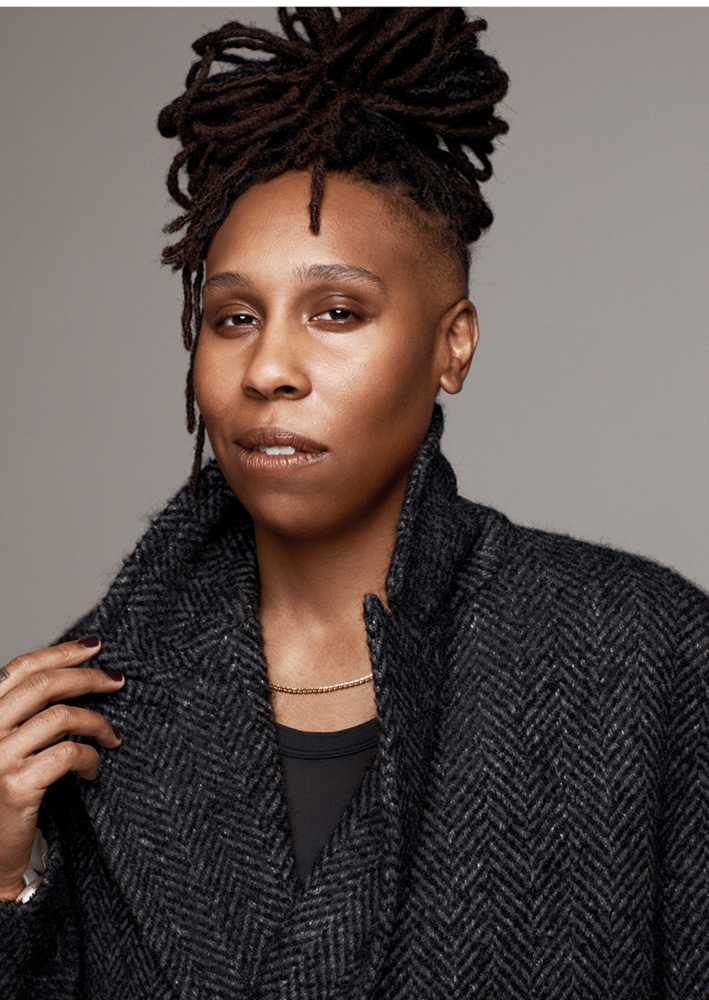
COAT: PRADA. SHIRT: CALVIN KLEIN UNDERWEAR 205W39NYC. NECKLACE: TIFFANY & CO. HAIR: CHRISTINA “TINA” TRAMMELL. MAKEUP: OZZY SALVATIERRA/LOWE & CO. MANICURE: BETINA GOLDSTEIN USING TOM FORD/LOWE & CO. SPECIAL THANKS: SMASHBOX STUDIOS.
WAITHE: Even though I did not have a father in my life to be an example of what a strong black man is supposed to be, I definitely found other father figures. As I got older and I saw the media attack black men, I made the conscious decision to make these black men the center of the story in The Chi and to humanize them. I don’t want people to look down on their lives or say that their lives are less valid than anyone else’s. I try to understand their path and their journey, rather than judge it.
JOY: Part of the problem is when you force women into a box and don’t give them full personhood, you’re also depriving men of full personhood. There’s also an archetype for men: this is what sex is, this is what conquest is, this is what being brave is. I don’t want my son to go through that. I want him to be able to be tender and vulnerable. I want him to be able to have some of the pleasures of what is stereotypically associated with being female. On my show we deal with certain tropes; these people are characters programmed to embody certain ideas. There’s the gunslinger character, and usually in Westerns he’s some stoic loner walking into the distance, fading into the horizon. But I was like, “If I’m letting [Evan Rachel Wood’s character] Dolores grow and do things, then shouldn’t he be allowed to break out of that archetype, too?” I’m hoping that this is a good period for women and men, ultimately.
SHAW: More women in the industry is so necessary. I hired all female directors, and half of my crew is female, because we want to give opportunities to those who have not had it. But we’re not just trying to get gender parity. There are huge discrepancies in this world about money and class, so it’s not like we can fight the system by buying our way in; we have to fight the system in order to lend a hand to those who don’t have access.
WAITHE: More often than not, when you walk into a room to pitch your show, whether it be your woman-ness, your blackness, your broke-ness, or your queerness, the person sitting in front of you can’t always relate to your experience. I have to hope and pray that the person can listen to me with an open heart and an open mind, because I’m asking them to empathize with these characters I created that are very much like myself.
ADLON: Okay, last question: When Oprah is elected president in 2020, who is your fantasy band or singer to play at her inauguration?
JOY: Dead or alive?
ADLON: A dead one and an alive one.
WAITHE: Okay, because Whitney Houston is my heart, I’ve got to say Whitney, in her prime. Alive: Solange.
SHAW: Oh my god. The person I listen to all the time is Chance the Rapper. And then I’ll say Bob Marley—don’t make fun of me.
JOY: Billie Holiday would be amazing. And then…I don’t know, I like Florence and the Machine.
COEL: Dead: Nina Simone. Living: I think I’m going to say Janelle Monáe. But it’s not my country!
SHAW: Wait, I’m changing mine. I want Nina Simone!
ADLON: I would say A Tribe Called Quest when Phife Dawg was alive. And then I would say Solange’s sister.

